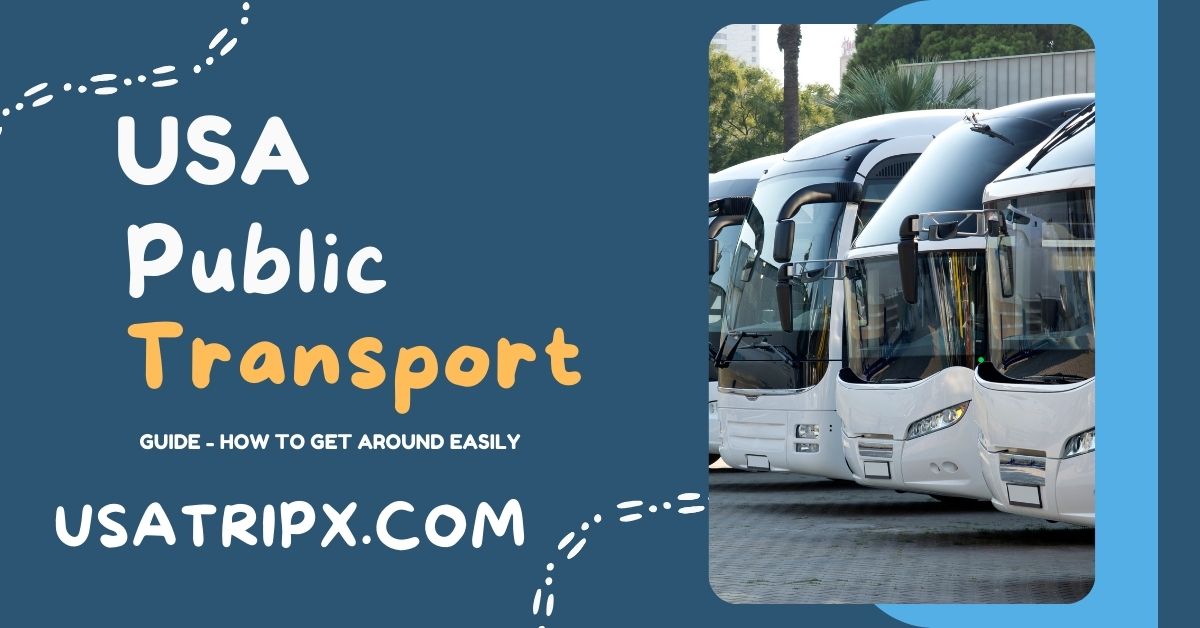Introduction
Traveling in the USA can be an exciting experience, but navigating the country’s vast public transportation system can seem overwhelming, especially for first-time visitors. While many American cities have excellent public transport networks, others rely heavily on cars. This guide will help you understand the best ways to get around efficiently, whether you are in a bustling metropolis or exploring rural areas.
1. Airports and Air Travel
Major International Airports
- John F. Kennedy International Airport (JFK) – New York City
- Los Angeles International Airport (LAX) – Los Angeles
- O’Hare International Airport (ORD) – Chicago
- Hartsfield-Jackson Atlanta International Airport (ATL) – Atlanta
- Dallas/Fort Worth International Airport (DFW) – Dallas
Domestic Air Travel
If you plan on covering long distances, domestic flights can save time. Airlines like Delta, American Airlines, United, and Southwest operate frequent flights between major cities. Booking flights in advance can help secure better fares.
2. Trains: Amtrak and Regional Rail
Amtrak
Amtrak is the USA’s primary passenger rail service, offering cross-country routes and intercity connections. Some popular Amtrak routes include:
- Northeast Corridor (Boston – New York – Washington, D.C.)
- California Zephyr (Chicago – Denver – San Francisco)
- Empire Builder (Chicago – Seattle)
While trains are comfortable, they can be slower than flights for long distances. However, they are an excellent option for scenic travel.
Regional Rail Services
Many metropolitan areas have efficient commuter rail networks, such as:
- MTA Metro-North (New York)
- BART (San Francisco Bay Area)
- SEPTA Regional Rail (Philadelphia)
- Metra (Chicago)
These systems are useful for travel between suburbs and city centers.
3. Buses: Intercity and Local
Intercity Bus Services
Buses are an affordable alternative for traveling between cities. Some reliable intercity bus services include:
- Greyhound – Covers most of the USA
- Megabus – Budget-friendly and serves major cities
- FlixBus – Expanding network with affordable fares
Local Bus Networks
Each city has its own local bus network, typically operated by the metropolitan transit authority. Examples include:
- MTA Buses (New York City)
- Metro (Los Angeles)
- CTA Buses (Chicago)
- WMATA (Washington, D.C.)
Apps like Google Maps and Transit can help navigate bus routes efficiently.
4. Subways and Light Rail Systems
Cities with Extensive Subway Systems
Some cities have well-developed subway and metro networks, including:
- New York City Subway (24-hour service)
- Washington, D.C. Metro
- Boston MBTA (The T)
- Chicago ‘L’ Train
Light Rail & Streetcars
Smaller cities offer light rail or streetcar services, such as:
- San Francisco Muni Metro
- Portland MAX Light Rail
- Seattle Link Light Rail
- New Orleans Streetcars
These systems are useful for urban and suburban travel.
5. Ride-Sharing & Taxis
Popular Ride-Sharing Services
Uber and Lyft operate in almost every major U.S. city, offering convenient transportation. They are great for areas with limited public transport options.
Taxis
Taxis are widely available in cities like New York, Chicago, and San Francisco. However, they tend to be more expensive than ride-sharing services.
6. Bicycle & Scooter Rentals
Bike-Sharing Programs
Many cities have bike-sharing systems for short-distance travel:
- CitiBike (New York City)
- Divvy (Chicago)
- Capital Bikeshare (Washington, D.C.)
Electric Scooters
Scooter rental services like Lime and Bird are available in many urban areas, providing an eco-friendly transport option.
7. Renting a Car
If you plan to explore rural areas, national parks, or places with limited public transport, renting a car may be the best option. Major rental companies include:
- Hertz
- Enterprise
- Avis
International travelers may need an International Driving Permit (IDP).
8. Tips for Using Public Transport in the USA
- Use Transit Apps: Google Maps, Moovit, and Transit App provide real-time updates on routes and schedules.
- Get a Transport Card: Many cities offer reloadable transit cards, such as the MetroCard (NYC), TAP Card (Los Angeles), and Ventra Card (Chicago).
- Check Schedules: Some public transport systems have limited late-night service.
- Be Mindful of Safety: Stick to well-lit areas at night and be aware of your surroundings.
Conclusion
Public transport in the USA varies widely by location, with major cities offering extensive networks while smaller towns may require alternative transport options. By planning ahead and understanding the available modes of transport, you can navigate the country efficiently and enjoy a stress-free travel experience.
